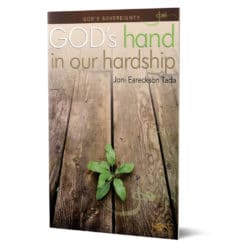Who Are the Great?

Last year during COVID, I gained strength from stories of great Christians.
Hi, I’m Joni Eareckson Tada and underline that word “great.” During the shelter-at-home restrictions last year, I decided to re-read books by Elisabeth Elliot, the great missionary who brought the Gospel to stone-aged people in South America. And I’m a firm believer that if you want to have great faith, then get to know people whose faith has survived the fire. People of great faith like Martin Luther or Susanna Wesley. Jonathan Edwards or Corrie ten Boom who survived the Nazi death camps. And William Carey – he was the father of modern missions who took the Gospel to India. Great saints, these are. And it’s so encouraging to be able to look to stalwart Christians of the past for inspiration. But who are those great believers of today? For that matter, what makes them great? And I sure do like how A.W. Tozer defines great. He says, “The great in the kingdom have been those who… [simply] loved God more than others did.” He goes on to say, “The one vital quality which [these people] have in common is spiritual receptivity. Something in them is open to heaven, something which urges them Godward…they have a spiritual awareness, and they go on to cultivate it until it becomes the biggest thing in their lives.”
So, according to Tozer, you don’t have to be a famous evangelist or a mother of sixteen children like Susanna Wesley. You don’t have to be a missionary to India or to the Amazon natives in South America. To be great, you don’t have to be a theologian like Luther or even Corrie ten Boom who endured a World War II death camp. These are not the circumstances that made these Christians great. What made them great is the manner in which they trusted God in those circumstances. They did not allow great suffering to shut down their openness to heaven. They did not let suffering foster doubts about God’s goodness or his plan in their life. Instead, these believers held fast; they held firmly to God and his promises as it says in 1 Corinthians 15. And as a result, their hardships stretched their souls’ capacity for the Lord. They stewarded their suffering well, and so their faith increased. And with an enlarged faith, they loved God more. Every time they chose to trust God and not complain, their faith and their love for the Lord increased further. Their spiritual awareness grew, as well, as did their degree of confidence and openness to heaven’s plan.
So if your ambition is to have no ambition except to be pleasing to God – friend, you are great in his kingdom. If you look for the way up in your trials, rather than the way out of them, you are great in his kingdom. And if Jesus thus becomes the biggest, the most wonderful thing in your life, you are great in his kingdom. The mediocre, lukewarm follower of the Lord – well, that person senses God’s nudgings, but does nothing about it. But that’s not you, if you are spiritually great. You are the one who develops the lifelong habit of being open, being receptive and responsive to the Spirit’s leading. I mean, when you read Psalm 27, you are the one whose heart says to God, “Your face, O Lord, I will seek.” That’s right. You’re the one who seeks him with all your heart, even through the worst of times. The Lord is looking right now for people who will love him more than in the average way. And if you sense he’s leading you to a deeper level of trust, do something about it. Take action. Be obedient to the heavenly vision. For then you’ll be great in his kingdom.
© Joni and Friends

God’s Hand in our Hardship
Find honest, biblical answers to tough questions about God’s sovereignty. Look at how a gracious and loving God can allow you to suffer, why “good” people have to suffer and how good can come from it.





